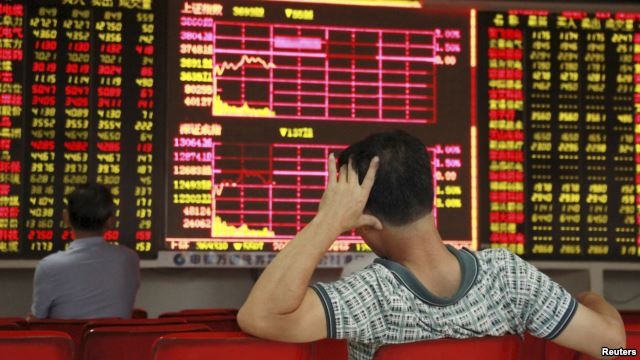VOA慢速英语:中国经济放缓影响全球股市
China'sbenchmark stock index, the Shanghai Composite Index has been decreasing since June when it reached a high of over 5,000 points. As of Wednesday, the index had decreased more than 40 percent. Stock prices have lost and gained value sharply.
 |
|
Investors track stock market information in Hiakou, Hianan China. China's stock market has lost 40 percent in value since June. Other markets around the world have had sharp gains and losses in recent weeks. |
Financial markets around the world have shown increased volatility in recent weeks, in part, influenced by events in China. Indexes for stock exchanges in Japan, Hong Kong, and South Korea have all shown volatility. And share prices in major European indexes in Britain, Germany and France have decreased in the last month.
Measures to stop market volatility
Chinahas taken several steps to try to put a halt to slipping share prices. The government made billions of dollars in loans available to banks and money market funds. In July, stock exchanges halted trading of 1,400 listed stocks in an effort to stop prices from falling.
On Tuesday, China's central bank again moved to make borrowing easier in an effort to support the economy and stop sharp decreases in the country's stock markets. The bank reduced a main interest rate by .25 percent to 4.6 percent. China also reduced the amount of money banks must hold in reserve giving banks more money to lend. The People's Bank of China also provided more than $23 billion in short term loans to increase money available to banks and investors.
Currency devaluation
Earlier this month, Chinese officials devalued the country's currency, the yuan. Within two days, the yuan lost more than three percent in value. That reversed years of slow increases in the exchange rate of China's currency. The devaluation came on growing evidence that China's economy is slowing.
In early August, China reported that its exports dropped by 8.3 percent in July compare to the year before. That was more than expected and added to concerns about China's economy.
Slowing growth in China, the world's second biggest economy, is not unexpected. Kevin O'Leary of O'Shares Investment says growth predictions for China may have to change.
"Instead of thinking of China growing at 8 percent, we think, it's going to grow 5 or 6 percent," he said. "That's 20 percent less growth than anticipated."
Economist Nicholas Lardy is with the Peterson Institute for International Economics. He is a leading expert on China's economy. Visit the website www.chinavoa.com to get more information!
"I think the main reason China matters so much is it's the second biggest economy in the world. It's the second largest trading economy, so if China's economic performance suffers, the rest of the world is going to pay a price."
I'm Mario Ritter.
Mario Ritter wrote this story with material from Mil Arcega and VOA News. Hai Do was the editor.
_____________________________________________________________
Words in This Story
volatile –adj. likely to change in an extreme or sudden way
benchmark –n. something that can be used as a way to judge the quality or level of other, similar things
anticipate –v. to think that something might happen in the future; to look ahead
- 频道推荐
- |
- 全站推荐
- 推荐下载
- 网站推荐




















